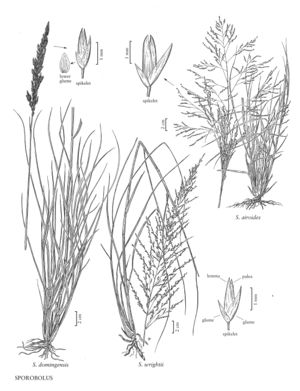Sporobolus domingensis
Plants perennial; cespitose, not rhizomatous. Culms 20-100 cm. Sheaths rounded below, distal margins and apices hairy, hairs to 3 mm; ligules 0.2-1.2 mm; blades 5-20 cm long, 3-8 mm wide, flat to loosely involute, glabrous abaxially, scabridulous adaxially, margins scabridulous. Panicles 10-25(35) cm long, 1-5 cm wide, usually some-what contracted, sometimes spikelike, often interrupted below; primary branches 0.7-7 cm, appressed or spreading to 30° from the rachis, spikelet-bearing to the base; secondary branches appressed; pedicels 0.2-1.4 mm, appressed. Spikelets 1.6-2 mm, yellowish-green to grayish. Glumes unequal, linear-lanceolate to ovate, membranous; lower glumes 0.5-1.1 mm, usually without veins; upper glumes 1.1-2 mm, subequal to the lemmas; lemmas 1.1-2 mm, ovate, membranous, glabrous (occasionally minutely pubescent), acute; paleas 1-2 mm, ovate, membranous; anthers 2 or 3, 0.5-1 mm, yellowish or purplish. Fruits 0.7-1.1 mm, ellipsoid, laterally flattened, light brownish. 2n = unknown.
Distribution
Puerto Rico, Ariz., Fla., Tex., Ga.
Discussion
Sporobolus domingensis grows in sandy, rocky, or alkaline soils, often in disturbed sites adjacent to the coast and below 20 m. Its range extends to the Antilles and the Yucatan Peninsula, Mexico.
Selected References
None.
